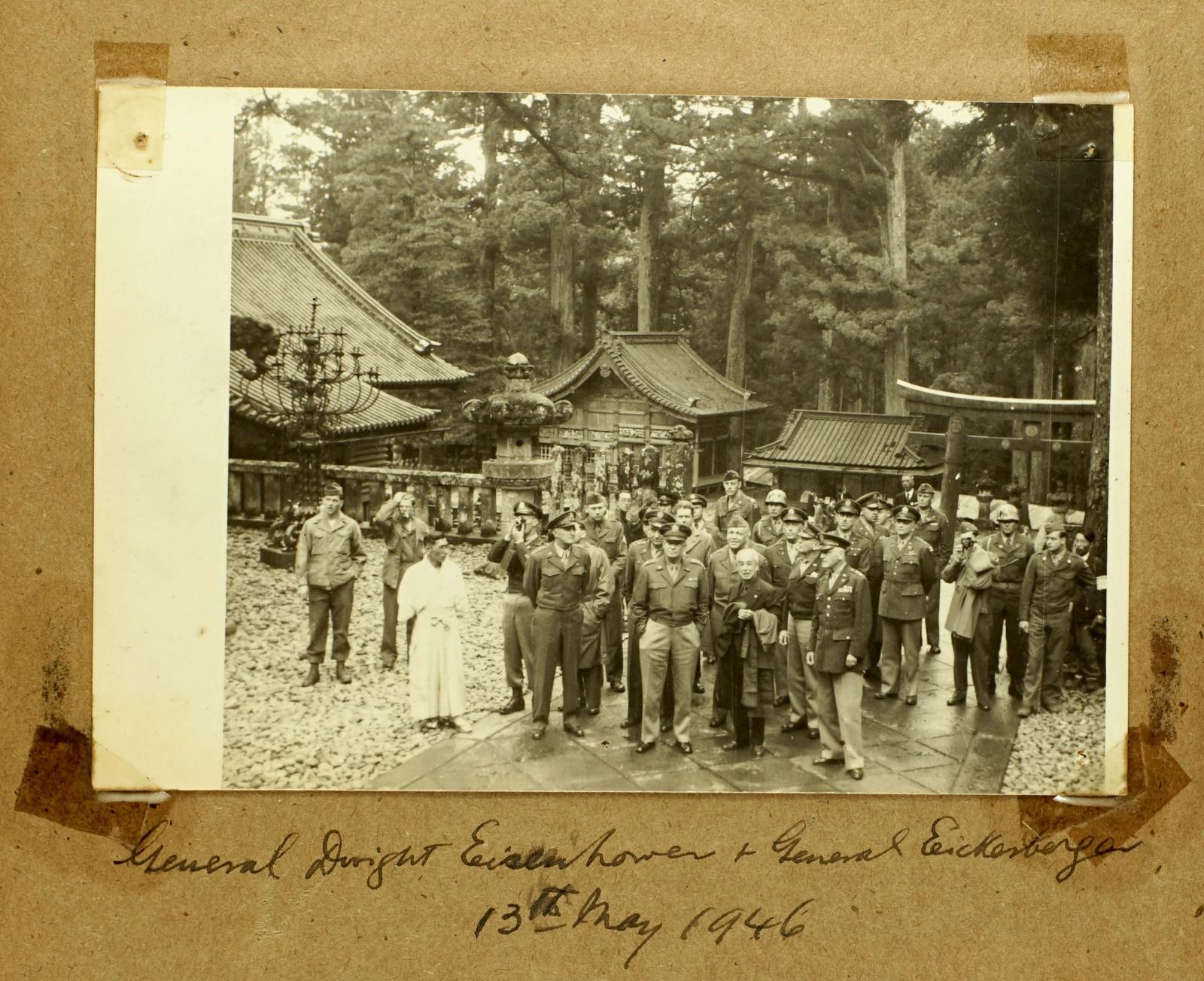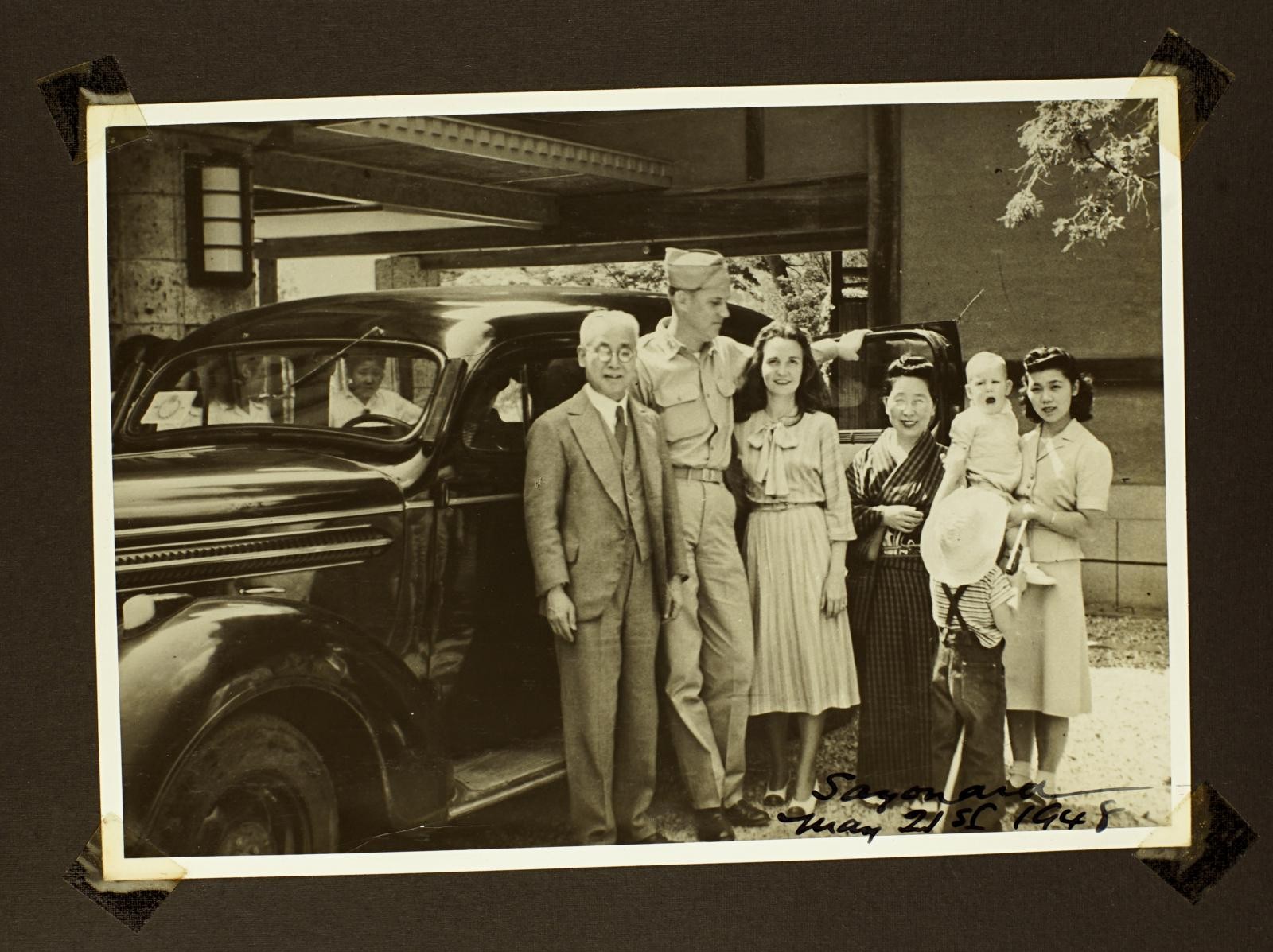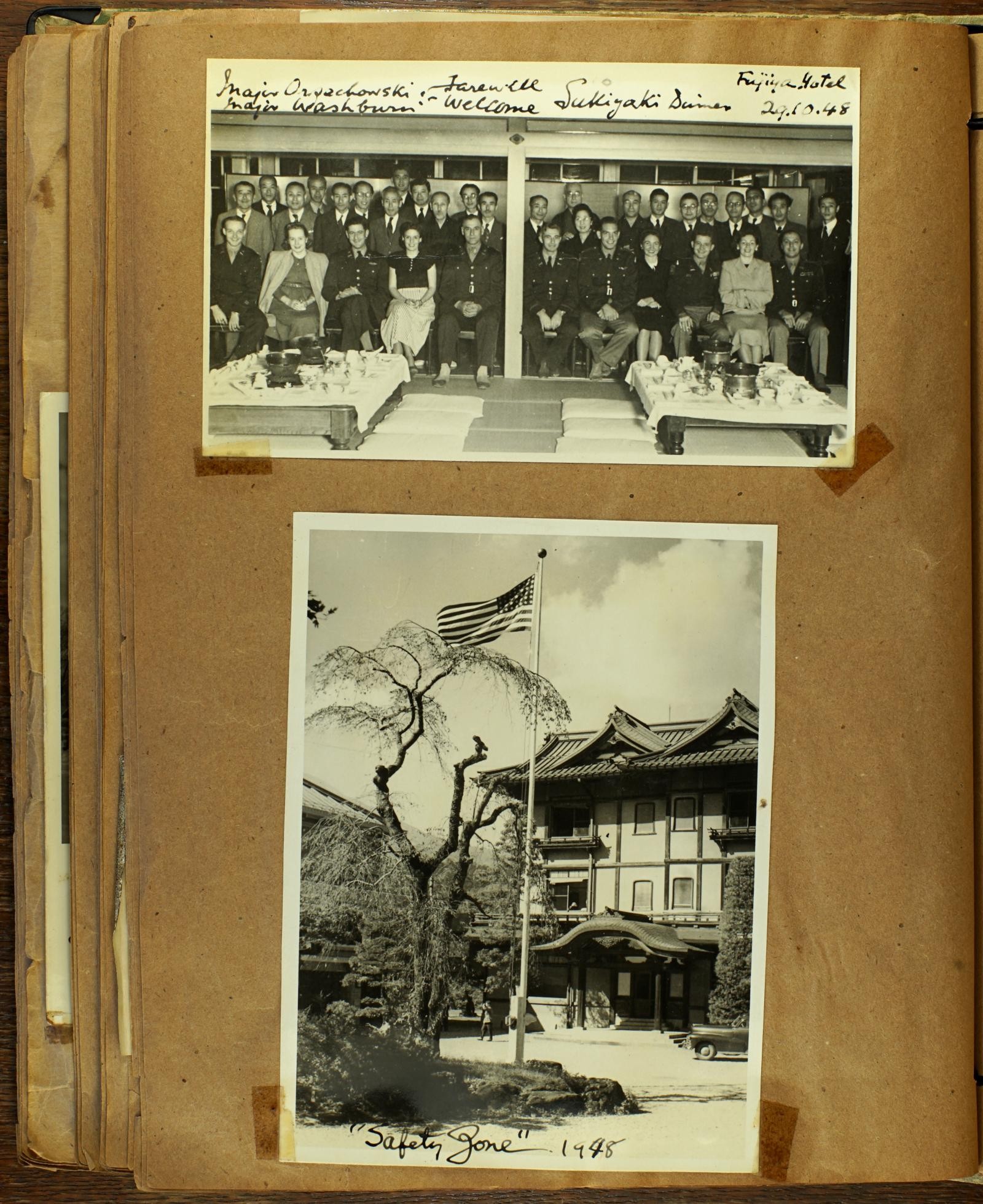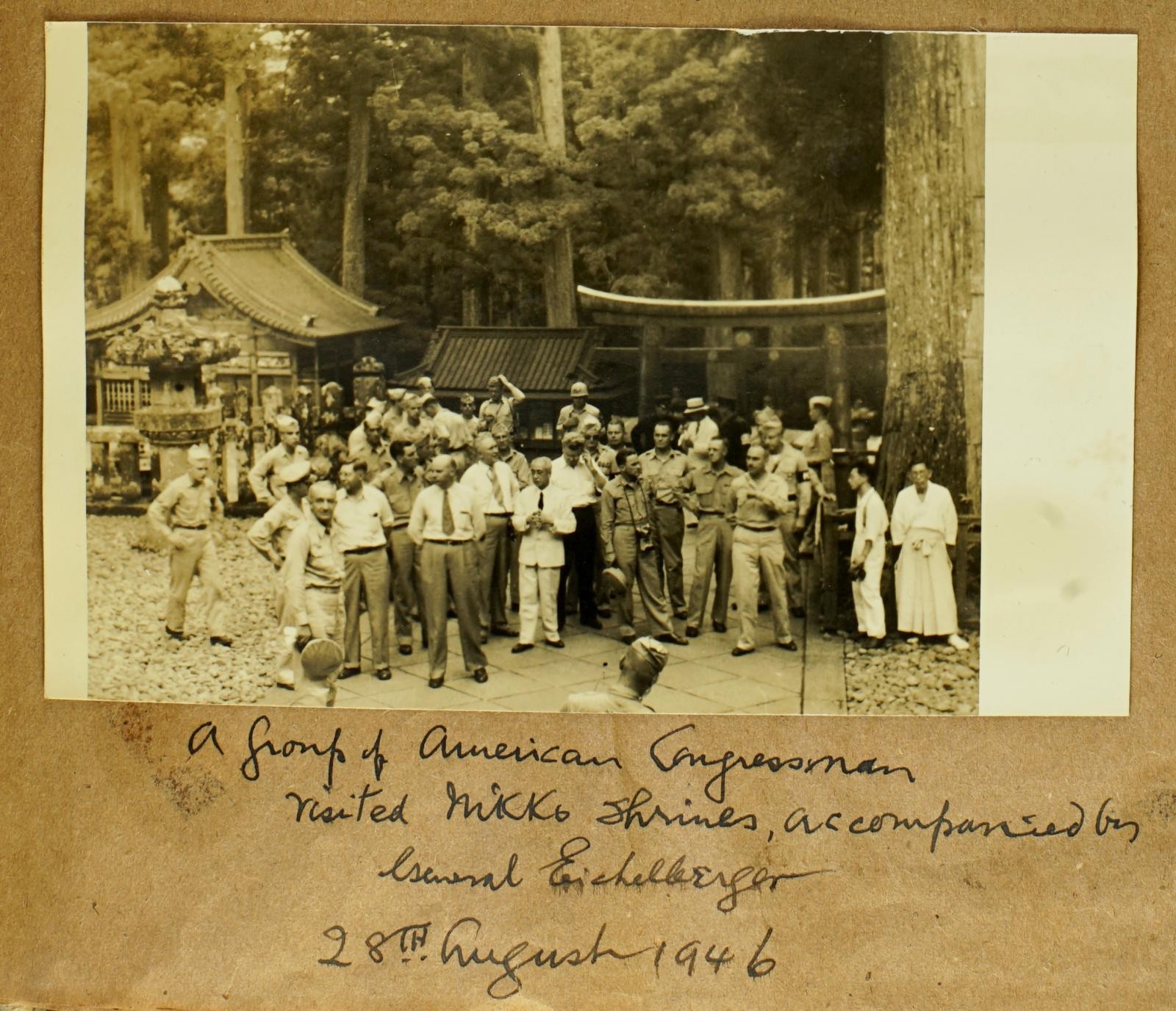74:接収の記憶 -A Memory of the Requisition-
1945年(昭和20年)10月17日、当ホテルは米軍に接収され、保養所となりました。
以降、1952年(昭和27年)の接収解除まで、実に7年に渡って接収は続きました。
On October 17, 1945 (Showa 20), our hotel was requisitioned by the U.S. Army and became a recreational facility. The requisition lasted for seven years, until it was lifted in 1952 (Showa 27).
さて、まず少し時間を前に戻して戦前、特に戦争前夜の頃のホテルはどのような様子だったでしょうか。
金谷眞一はこのように回想して書き残しています。
—
支那事変が始まってから、だんだんと統制が強化されて来た。そしてホテルの食糧は厳しい監視をされる様になって来た。
然しこの様な情勢になるにつれても外貨獲得は絶対に必要である為、ホテル経営の基礎資材である肉、バターの配給等は少ないながらもあった。
然しお客の数は、昭和十五、六年頃となると、だんだん減って来た。
(中略)
グズグズして居る中に、英米との関係は、益々悪化する。軍部のスパイに対する活動は、神経質になって来て、凡有外国人に対して、刑事か憲兵が附添って、その行動を見張る様になってきた。
各国の外交官でも宿泊しようものなら、それこそ大変の騒ぎである。警察や憲兵の神経は、ホテルに集中されるという状態だ。こんな時代を後から考えると、よくも神経衰弱にもならず、通して来られたものであると考えるが、その渦中に居ると案外平気なものだ。
この嵐を前にした様な、不気味な空気の中にあって吾々は、軍部が目の敵とする外客の、接遇をやらなければならなかったのだ。
—
それでは、戦中のホテルはどのような様子だったでしょうか。
—
英米との関係が悪化していつ戦争と云う不幸な事態が発生するかも解らない様になって来た頃から、如何してこのホテルを維持して行くか、私はまことに焦慮煩悶させられた。不幸にして戦争になった場合の見通しは全然つかない。
(中略)
従業員の中で身体が壮健で働き盛りのものは挺身隊にとられる、招集されて戦場へ行く、ホテルの事業の前途に見切りをつけて、軍需工場に転職して行く、と云う様に、一人減り二人減りと云うわけである。
(中略)
この土地にある古河電気精銅所に於いても、労働者は日に日にその数を増して来る。挺身隊が続々繰り込んで来る。そして、工場に働く工員の数は、二倍にも三倍にも増してきた。そうなるとこうした挺身隊の宿舎が必要となる。
「金谷ホテルがある、あれを挺身隊に使え」と云うことになってきたのも勢いの赴くところ致し方なかったと思う。
ホテル計りではなく日光町全体の宿泊設備がこうした状態に直面をして居る時であるので、挺身隊の宿舎として使って貰うより方法がなかったとも謂える。
この時幸いにして金谷ホテルには女子挺身隊が配属されることになった。そこで新館全部を解放してその宿舎に当てることとした。
何百畳と云う畳が運び込まれる、何百枚と云う布団が運び込まれる、ホテルの姿は日一日と戦争を狂気の様に遂行して行こうとする国の姿になってしまった。
それでも挺身隊が全部を占有して終うと云う訳ではない。他の部分は空いて居た。
すると或日これを学習院の初等科生徒の疎開として使い度いとの申し出があった。そこで私も空いて居るこの建物を使わせないと云う理由はない。
それに、皇室の関係の方々、例えば皇太子殿下(※)や義宮様等も日光にある各御用邸を疎開に利用される為に、金谷が学習院の疎開場所として必要であると言われれば、これをお断りする理由もない。是非そうしてあげなければ、私の顔が立たない。こう考えて学習院の生徒の疎開場所として提供することとした。
皇太子殿下や義宮様は、他の日光御用邸に分宿されたが、毎日の授業はホテルに特に設けられた教室で行われた。
(中略)
昭和二十年八月十五日の陛下の終戦の御言葉は言々句々、肺腑を抉られる様に悲しかったが、何かしら救われた様な心地もした。そしてホテルの進路も何ん(ママ)とかどこかに開いて行くのではないかと云う、微かな安心感がほのぼのと心に湧上がって来る様に感じられた。
(※)現在の上皇陛下
—
そして、戦後。
接収中に来晃したアイゼンハワー参謀総長(後の大統領)とのやりとりついて、眞一はこのように書き残しています。
—
(アイゼンハワーから眞一へ)「一体ホテルの接収に相当した料金を、日本政府から貰って居るかね」との質問である。
その当時は終戦から一年も経っていない時分である。
心ないアメリカの軍人は、物資の欠乏の極にある日本の状態も考えず、随分無理なことを言って私共を責めたものだ。
それに日本政府としても財政が極度に窮乏して居る。有様で、ホテルの接収料金等が満足に払えるものではない。
三ヶ月も、四ヶ月も滞る有様であった。そこで私は日本政府の金は中々出ないが、何んとかやって居ますよと答えた。
この話を聴いて居られたアイゼンハウアー大将は「米軍は、それでは金谷familyに面倒を見て貰って居るんだねえ、まことに有難う」と言われたことを覚えて居る。
—
また、同書の「アイケルバーカー中將の厚意」にこのようなエピソードがあります。
—
終戦の翌年の春アイケルバーカー中將が日光に来られた。私は中将(ママ)を案内して東照宮へ行った。
中将は幼い時代に日本に暮らした人であるから、東照宮に対する概念をもって居られたことと思う。
私の案内で詳細に見られたアイケルバーカー中将は私に「終戦後このお宮を保存することで困ることはないか、何ん(ママ)でも自分で手伝うことがあれば遠慮なく云って呉れ」との話である。
私はその時鐘楼の側に中将を連れて行った。そしてその建物の「釘かくし」に使われて居る真鋳の金具が、スーベニアーとして心ないアメリカ兵隊に盗んで行かれる。この儘にして置いたなら何を持って行かれるか知れない旨を話した。すると将軍は「それは困ったことである」と言われて深く考えて居られる。
私共は石段を下りて来た。
何んの話であったか忘れたが、その時徳川公爵の話をする必要があったので私が Mr.Tokugawa と言い出した。将軍は私に、何故 Prince Tokugawa と言わないかと言う。私は戯言を交えて「アメリカが公爵等と言ってはいけないと言うから、そう言えないのですよ」と言った。
将軍は沈痛な顔をして「馬鹿な戦争をしたもんだ。日本が真珠湾の攻撃をしなかったら、こんな戦争はしないで済んだろうに」とまことに慨嘆に耐えないと云う表情をされた。
その翌日第八軍の命令で数名のM・Pが来た。そして東照宮の護衛に二ヶ月半も当って呉れて、この国宝を守って呉れた。
その後三度も日光へ来られた将軍とは、いつも十年の知己の様に私は親しくして居た。
「ホテルと共に七拾五年」金谷眞一・著(以上の引用は全て同書から)
—
この他にも、眞一はそれまでの交友関係のあったアメリカやイギリスの友人の名前を挙げて、その後の交流や変わらぬ友情について同書に多く記してします。
これもホテルに残る証言ですが、「進駐軍からアメリカンクラブサンドを教わった」といいいます。
戦争とその後の接収を経験したホテルは、戦後78年、接収解除後71年を経た今でも、各国からのお客様をお迎えしております。
こうした記憶とその記録が残っていることが、宝物の一つとなっています。
Now, let's turn back the clock a bit to the pre-war era, particularly on the eve of the war. What was the hotel like then? Shinichi Kanaya wrote about his recollections as follows:
—
After the start of the China Incident, regulations gradually became stricter. The hotel’s food supply came under close scrutiny. However, as foreign currency acquisition was an absolute necessity in such circumstances, we still received small rations of essential hotel supplies like meat and butter.
Nevertheless, the number of guests gradually decreased around 1940 and 1941.
(Omission)
While we lingered, relations with the U.S. and U.K. worsened. The military police's activities against spies grew more sensitive, and a detective or a military policeman would be assigned to every foreigner to monitor their movements. If a diplomat from any country stayed with us, it would cause a great commotion. The police and military police’s attention was focused on the hotel. Looking back on those days, I think it's a wonder that I didn't suffer a nervous breakdown and made it through, but when you are in the midst of it, you are surprisingly composed. In that eerie atmosphere, like the calm before a storm, we had to continue our duties of serving foreign guests, who were an object of hostility to the military.
—
So, what was the hotel like during the war?
—
As relations with the U.S. and U.K. worsened and it became unclear when the unfortunate event of war might break out, I was truly worried and tormented about how to keep this hotel going. I had no idea what to expect in the event of war.
(Omission)
Among the employees, the able-bodied ones in their prime were taken for the Volunteer Corps, were called up and sent to the battlefield, or left the hotel business to find work at munitions factories. It was a situation where the number of employees dwindled one by one.
(Omission)
At the Furukawa Electric Refining Plant in this area, the number of workers increased daily. The Volunteer Corps kept pouring in. And the number of factory workers doubled and tripled. This created a need for housing for the Volunteer Corps.
I suppose it was inevitable that they would say, “There’s the Kanaya Hotel, use that for the Volunteer Corps.” It was a time when not just the hotel but all the lodging facilities in Nikko were facing this situation, so it could be said there was no other way but to let them use it as a barracks for the Volunteer Corps. Fortunately, a Women's Volunteer Corps was assigned to the Kanaya Hotel. We decided to open up the entire new wing for their accommodation. Hundreds of tatami mats and hundreds of futons were brought in, and the hotel's appearance day by day reflected a country that was desperately pushing ahead with the war.
Still, the Volunteer Corps did not occupy the entire building. Other parts were empty. One day, we received a request to use it as an evacuation site for students from the Gakushuin Primary School. I saw no reason not to let them use the empty building. Additionally, since members of the Imperial Family, such as the Crown Prince (now the Emperor Emeritus) and Prince Yoshi, were using their imperial villas in Nikko for evacuation, it was said that the Kanaya was necessary as an evacuation site for Gakushuin, and I had no reason to refuse. On the contrary, it would have been a disgrace for me if I had not done so. So I decided to offer the space for the Gakushuin students' evacuation. The Crown Prince and Prince Yoshi were housed in other Nikko villas, but their daily classes were held in a specially prepared classroom at the hotel.
(Omission)
On August 15, 1945, His Majesty's words at the end of the war were so deeply sad, each word and phrase a stab to the heart, but I also felt a sense of relief. And a faint feeling of reassurance that the hotel's path might somehow open up somewhere welled up in my heart.
—
Then, after the war. Shinichi wrote about his interaction with General of the Army Dwight D. Eisenhower (later President) during his visit to Nikko after the requisition:
—
(Eisenhower to Shinichi) "Have you received a reasonable fee from the Japanese government for the hotel's requisition?"
This was less than a year after the war ended. The thoughtless American soldiers, without considering the extreme shortage of goods in Japan, made many unreasonable demands and blamed us. In addition, the Japanese government was in an extremely difficult financial situation and could not pay the hotel's requisition fees satisfactorily. Payments were delayed for three or four months. So I replied that while it was difficult to get money from the Japanese government, we were somehow managing. General Eisenhower, upon hearing this, said, "So the U.S. Army is being looked after by the Kanaya family. Thank you very much," and I remember his words.
—
Furthermore, in the same book, there is an anecdote titled "General Eichelberger's Kindness."
—
In the spring of the year after the war ended, General Robert L. Eichelberger came to Nikko. I guided the General to the Toshogu Shrine. I believe the General had a sense of the Toshogu Shrine because he had lived in Japan as a child. After inspecting it in detail with me, General Eichelberger asked me, "Is there anything you are having trouble with in preserving this shrine after the war? Please don't hesitate to tell me if there is anything I can help you with." At that moment, I took the General to the side of the bell tower. I explained that the brass fittings used as "nail covers" on the building were being stolen by thoughtless American soldiers as souvenirs. I said that if things continued this way, there was no telling what else would be taken. The General looked distressed and said, "That is a serious problem," with a deeply thoughtful expression. We walked down the stone steps.
I have forgotten what we were talking about, but at that moment, I needed to mention Duke Tokugawa, so I started by saying "Mr. Tokugawa." The General asked me why I didn't say "Prince Tokugawa." I jokingly replied, "America said we shouldn't use titles like 'Duke,' so I can't say it." The General looked sad and said, "What a foolish war we fought. If Japan had not attacked Pearl Harbor, we would have avoided such a war," with an expression of profound regret.
The next day, several MPs came under the order of the Eighth Army. They guarded the Toshogu Shrine for two and a half months, protecting this national treasure. After that, I was always close with the General, who came to Nikko three more times, as if we had known each other for ten years.
"Seventy-Five Years with the Hotel" by Shinichi Kanaya (all quotes above are from this book)
—
In addition to these stories, Shinichi also wrote extensively in the same book about his relationships with American and British friends from before the war, their subsequent interactions, and their unwavering friendship.
Another account that remains at the hotel is that they were taught how to make "American club sandwiches" by the occupying forces.
Even now, 80 years after the war and 73 years after the requisition was lifted, the hotel that experienced the war and the subsequent occupation continues to welcome guests from various countries. The survival of these memories and records is one of our greatest treasures.



